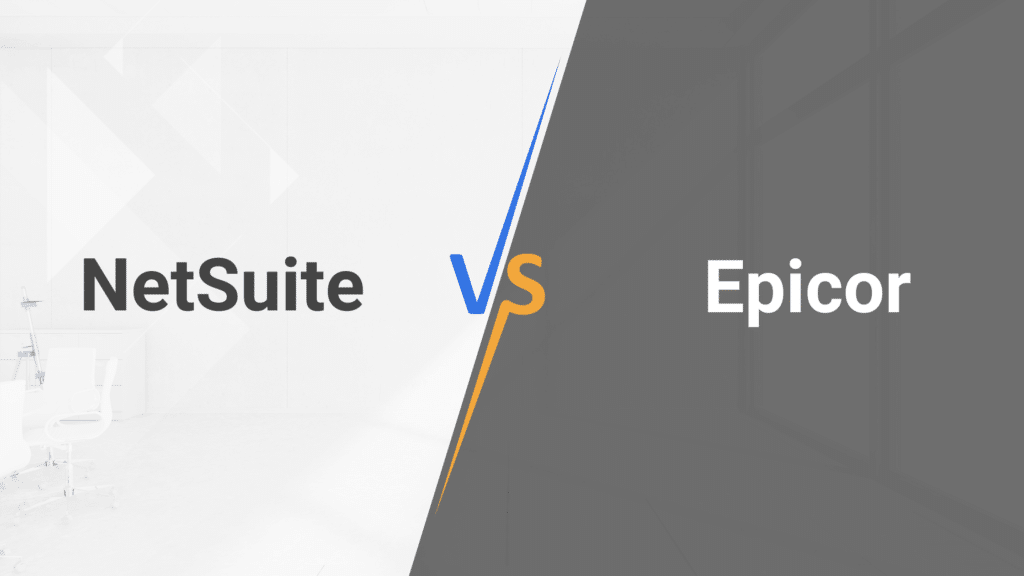Choosing the best Enterprise Resource Planning (ERP) system for your company is a crucial decision that can significantly influence your operational efficiency and business growth.
Among the myriad options available, NetSuite and Epicor become two leading solutions, each with unique strengths and tailored functionalities.
This comparison delves into the nuances of both ERP systems to help you determine which is the more suitable choice for your organization.
With a particular focus on NetSuite’s innovative features and cloud-based advantages, we’ll explore how each platform can cater to different business models, sizes, and industry needs.
Whether you’re drawn to NetSuite for its scalability and broad industry appeal or Epicor for its depth in manufacturing and distribution capabilities, this guide aims to provide you with the insights needed to make an informed decision.
Still deciding between NetSuite and Epicor? Get a personalized pricing estimate from Cumula 3 Group to help make the right call.
ALSO READ:
→ The True Cost of Not Investing in Warehouse Management Software
→ NetSuite vs Intacct: Ultimate Insiders Guide
A brief history
NetSuite
NetSuite, was founded in 1998 by Evan Goldberg. The company started out as a web-hosted accounting management software, but quickly evolved into an end-to-end cloud-based solution for ERP, financial planning, and omnichannel commerce.
In 2016, NetSuite was acquired by Oracle for an estimated $9.3 billion. Today, the company serves over 16,000 customers in more than 200 countries and territories, and is widely considered a pioneer in the cloud-based software space.
Epicor
Epicor was founded in 1972 as Triad Systems Corporation. It began as a financial accounting product for multi-user LAN-based environments but later specialized in manufacturing solutions and operations, following a merger with DataWorks. The company renamed to Epicor Software Solution in 1999.
Currently owned by PE firm KKR, for the purchase price of 3.3 billion in 2016, the company has 20,000 customers in 150 countries, and over 15 different products for retail, manufacturing, production, and several others.
NetSuite vs Epicor – Head-to-Head Comparison:
The journey to select the right ERP system for your business brings you face-to-face with many contenders, among which are NetSuite and Epicor, which are among the best.
Each system offers unique advantages tailored to different business landscapes.
To ensure you’re equipped with the necessary insights to make an informed decision, let’s delve deeper into what each platform brings to the table:
NetSuite: Your Cloud-Based Ally for Scalable Growth
- Versatile and Cloud-Driven: NetSuite stands out as a cloud-based ERP solution, offering unparalleled flexibility and accessibility. This means you can manage your business anytime, anywhere, which is essential in today’s mobile-first world.
- Scalability at Its Core: With its roots deeply embedded in the cloud, NetSuite is designed to grow as you grow. With this scalability, NetSuite grows with you, adapting to new challenges without interrupting your processes.
- A Jack of All Trades: NetSuite prides itself on being industry-agnostic, making it a fit for a vast spectrum of business types. From retail to services, small businesses to large enterprises, NetSuite’s toolset is broad enough to cater to diverse business processes and needs.
NetSuite is also distinguished by its single-version model, ensuring all users automatically receive the latest updates simultaneously.
This unified approach eliminates the complexities and costs associated with managing multiple versions and allows NetSuite to consistently deliver the latest features and technologies.
It streamlines the addition of new capabilities, facilitating rapid adaptation and business growth. Conversely, businesses using on-premise solutions or multiple cloud versions face higher costs for server maintenance and slower innovation due to their fragmented systems.
Epicor: The Tailored Solution for Industry Specialists
- Choice in Deployment: Epicor stands apart by offering both cloud-based and on-premise solutions. This flexibility allows businesses to select the deployment model that best fits their specific operational needs and technological infrastructure.
- In-depth Industry Insight: Epicor shines in its in-depth understanding of the intricacies of the manufacturing and distribution industries. It’s about offering the right tools that speak directly to these sectors’ unique challenges and nuances.
- Customization is Key: Customizations can be costly and must be maintained or updated when new product versions are released. Additionally, organizations must find the correct partner capable of coding and maintaining these customizations. On the other hand, NetSuite offers automated tools to facilitate customizations to make it easier to adapt the system to any environment. This way, the business can dictate how the ERP system is configured to support the industry and growth rather than being boxed in by the ERP system, forcing the company to adapt to the ERP system
Choosing between NetSuite and Epicor is more than just picking an ERP system; it’s about choosing a partner for your business’s journey.
NetSuite offers a broad, scalable, and cloud-based solution designed to meet the needs of various industries, making it an excellent choice for businesses looking for flexibility and growth.
On the other hand, Epicor provides a more focused and customizable solution, especially for those in the manufacturing and distribution sectors. It offers the option of cloud-based or on-premise deployment.
Your decision will ultimately hinge on understanding your business’s needs, both now and in the future.
Do you value broad-based functionality and scalability, or are industry-specific features and customization more critical for your operations?
The answer to this question will guide you toward the ERP system that best suits your business’s goals and growth trajectory.
ALSO READ:
→ 8 Things Fabrication Shops Need To Know Before Buying Metal Fabrication Software
→ The Ultimate Cheat Sheet – Incacct vs. NetSuite
Feature Face-Off: NetSuite vs Epicor in Financial, Inventory, and CRM Management
When choosing between NetSuite and Epicor, it’s like comparing two top athletes; both excel, but in slightly different areas.
Let’s break down each key feature and how these can align with your business needs:
1. Financial Management
Thanks to its comprehensive financial management capabilities, NetSuite’s system provides a real-time view of your financial health.
Whether tracking cash flow, managing expenses, or closing the books faster, NetSuite streamlines these operations, making it easier for businesses to stay on top of their financial game.
Epicor, tailored to meet the complex needs of manufacturing and distribution industries, comes equipped with financial management tools.
These are designed to handle the intricate financial operations of these sectors, from cost calculations to project accounting, ensuring that businesses understand their financial position.
2. Supply Chain and Inventory Management
NetSuite offers a unified solution that integrates all inventory and supply chain management facets.
This integration enhances visibility and control throughout the supply chain, from procurement to payment, helping all businesses, including manufacturing and distribution, manage their resources more efficiently and reduce costs.
Epicor’s approach to supply chain management is embedded in the specific needs of manufacturing and distribution.
It provides detailed solutions focused on improving efficiency in these areas, such as inventory tracking, more efficient order processing, and tighter control over the supply chain, all designed to boost operational efficiency and productivity.
3. Customer Relationship Management (CRM)
With NetSuite, CRM is not just an add-on; it’s seamlessly integrated with the rest of the business processes.
This integration offers a 360-degree view of the customer, enhancing insights and engagement across sales, marketing, and customer service.
The result is a more cohesive, customer-centric approach that can lead to improved customer satisfaction loyalty and a greater opportunity to increase revenue.
Epicor’s CRM capabilities are molded around the needs of manufacturing and distribution industries.
With a focus on sales management, Epicor CRM is designed to streamline the sales process, improve customer interactions, and ultimately drive sales efficiency, making it particularly valuable for businesses in these sectors.
4. Human Capital Management
NetSuite offers a comprehensive workforce management suite, from recruitment to retirement.
Its cloud-based system enables seamless management of employee data, payroll, benefits, and performance, supporting global compliance and strategic HR planning.
Epicor provides tools for workforce management, tailored to meet the needs of industries it serves.
Its focus on manufacturing and distribution sectors means HR functionalities are designed to efficiently handle some labor rules, job costing, and employee scheduling.
5. E-Commerce and Retail
NetSuite shines in this area with its integrated e-commerce platform, supporting B2B and B2C operations.
Its capabilities extend to online sales, in-store, and omnichannel retail, offering a seamless customer experience across all touchpoints.
Epicor approaches e-commerce with a focus on the needs of manufacturers and distributors.
Its solutions aim to enhance online sales processes and integrate them with backend systems for streamlined operations.
6. Professional Service Automation
NetSuite’s Professional Service Automation (PSA) solution is designed for service-based businesses, offering tools for project management, resource allocation, time and expense tracking, and billing.
This integration with its ERP and CRM systems provides a holistic view of the client lifecycle.
Epicor does not specifically highlight PSA as a standalone feature but incorporates project management and service capabilities within its ERP solutions.
This integration is particularly beneficial for manufacturing and distribution industries that require project-based tracking and billing.
Here are more details on the difference between NetSuite vs. Epicor:
| Overview | NetSuite | Epicor |
| Customers | 37,000 | 21,000* |
| Countries | 219 | 150* |
| Platforms Offered | 1 | 11 |
| Key Features** | ||
| Accounts Payable | ✓ | ✓ |
| Accounts Receivable | ✓ | ✓ |
| Financial Management | ✓ | ✓ |
| Inventory Management | ✓ | ✓ |
| Customer Relationship Management (CRM) | ✓ | ✗ |
| Omnichannel Commerce | ✓ | ✗ |
| Payroll | ✓ | ✗ |
*According to 2022 data from Epicor’s website
**Native to the ERP; not requiring different technology or separate databases
Both NetSuite and Epicor offer robust ERP solutions, but their strengths lie in different areas.
NetSuite provides a broad-based, scalable solution ideal for various industries, excelling in financial management, e-commerce, manufacturing, distribution and professional services.
Epicor, focused on manufacturing and distribution, offers depth in industry-specific functionalities, including supply chain management and CRM tailored to these sectors.
Your choice between NetSuite and Epicor will significantly depend on your business’s specific requirements, industry focus, and the functionalities most critical to your operations.
ALSO READ:
→ NetSuite vs Salesforce: A Review
→ Trends in Restaurant Management Software For Chains & Franchises
Key Differentiators: NetSuite vs Epicor
Understanding the nuances of usability, customization, implementation, support, and pricing is crucial when navigating ERP systems.
Here’s how NetSuite and Epicor fare across these vital areas:
1. Usability and Customization
NetSuite offers an intuitive web-based interface that simplifies navigation and operation, making it accessible for all levels of users. Its extensive customization capabilities, powered by SuiteScript, allow businesses to tailor the system extensively to meet their unique needs.
Epicor, on the other hand, delivers industry-specific customization options, catering especially to the manufacturing and distribution sectors. Despite its customizable features, it may require a steeper learning curve, a longer adaptation period for users, and higher support and maintenance costs.
2. Implementation and Support
The NetSuite cloud-based platform enables quicker implementation than traditional on-premise systems, with comprehensive online support resources available to assist users at any point.
Epicor offers a tailored implementation approach, supported by a dedicated network of partners. This ensures businesses have a system that fits their industry-specific needs and access to selected resources throughout the implementation process.
3. Pricing Model
NetSuite adopts a subscription-based pricing model that is scalable and modular, allowing businesses to choose and pay for precisely what they need. This can vary based on the number of users, selected modules, and service tiers.
Epicor provides licensing and subscription options, catering to a wide range of business sizes. This flexibility ensures that companies can select a pricing plan that aligns with their financial capabilities and operational requirements.
NetSuite and Epicor present compelling but distinct propositions across usability, customization, implementation, support, and pricing.
NetSuite’s strengths lie in its intuitive use, scalability, and cloud-based efficiency, making it ideal for businesses looking for a broad-based, flexible ERP solution.
Epicor excels in providing industry-specific customization and support, suited for businesses in manufacturing and distribution that require tailored solutions.
The choice between these two depends on a careful assessment of your business’s specific needs, growth expectations, and industry demands, ensuring that the ERP system you choose fits your current operations and supports your future ambitions.
To help you make a decision, the insights from the Gartner Magic Quadrant for Cloud ERP for Product-Centric Enterprises offer invaluable guidance for decision-makers aiming to enhance their operational efficiency with cloud-based ERP solutions.
Source: Gartner (October 2023)
ALSO READ:
→ Top 8 Requirements to Look for in a Food and Beverage ERP System
→ 10 Tips for Complying with Sales Tax Regulations
When comparing NetSuite’s and Epicor’s deployment options, one sees two paths leading to the same destination—efficient, streamlined business operations.
Yet, the journey on each path has its own set of landscapes:
1. Cloud vs. On-Premise
NetSuite stands out as a cloud-native pioneer, offering businesses a seamless and reliable cloud experience without the option for on-premise deployment. This approach is akin to having a team that plays exclusively in away games, fully adapted to perform at its best no matter where the match is held.
Epicor, on the other hand, started its journey in the realm of on-premise solutions. It has been making strides towards cloud adoption, providing flexibility for businesses transitioning to the cloud. However, it’s encountering hurdles in cloud performance and delivery, reminiscent of a team that’s excellent on home turf but still finding its footing in away games.
2. The Cloud Advantage
With the cloud’s growing importance in today’s digital world, NetSuite’s cloud-native edge offers a streamlined, integrated experience right from the start. This doesn’t just mean ease of access and reliability; it also translates to quicker updates, better and unparalleled security, and a model that scales with your business as it grows.
Epicor’s journey towards enhancing its cloud offerings is commendable. It shows a commitment to adapting and meeting modern business needs. This gradual shift acknowledges the benefits of cloud computing, aiming to reach the same level of efficiency and scalability that NetSuite delivers.
If your priority is having a powerful cloud-first ERP solution designed for seamless integration and reliability, NetSuite excels in this arena.
It’s like having a forward who scores consistently, ensuring your team’s success.
While traditionally more focused on on-premise solutions, Epicor is adapting and evolving, showing promise in the cloud space as well.
Both ERP solutions have their strengths, but NetSuite’s cloud-native foundation might offer that slight edge in today’s fast-paced, digital-first business environment.
ALSO READ:
→ Insider Advice Ahead Of Your NetSuite Implementation
→ Benefits from Integrated Restaurant Inventory Management Software
Conclusion – NetSuite vs Epicor
Selecting the right ERP system for your business is a pivotal decision that hinges on understanding your specific needs, the size of your operations, and the industry you’re in.
With NetSuite and Epicor as leading contenders, the choice is not about which system is superior but which more closely aligns with your business goals and operational requirements.
Ultimately, the decision between NetSuite and Epicor boils down to evaluating which system can better support your business’s unique processes, growth trajectory, and industry challenges.
Whether it’s Epicor’s industry-tailored capabilities or NetSuite’s scalable, integrated approach, choosing the right ERP system is critical to empowering your business for future success.
Read the comparison—now see what NetSuite might cost. Get tailored pricing and expert guidance from Cumula 3 Group.







